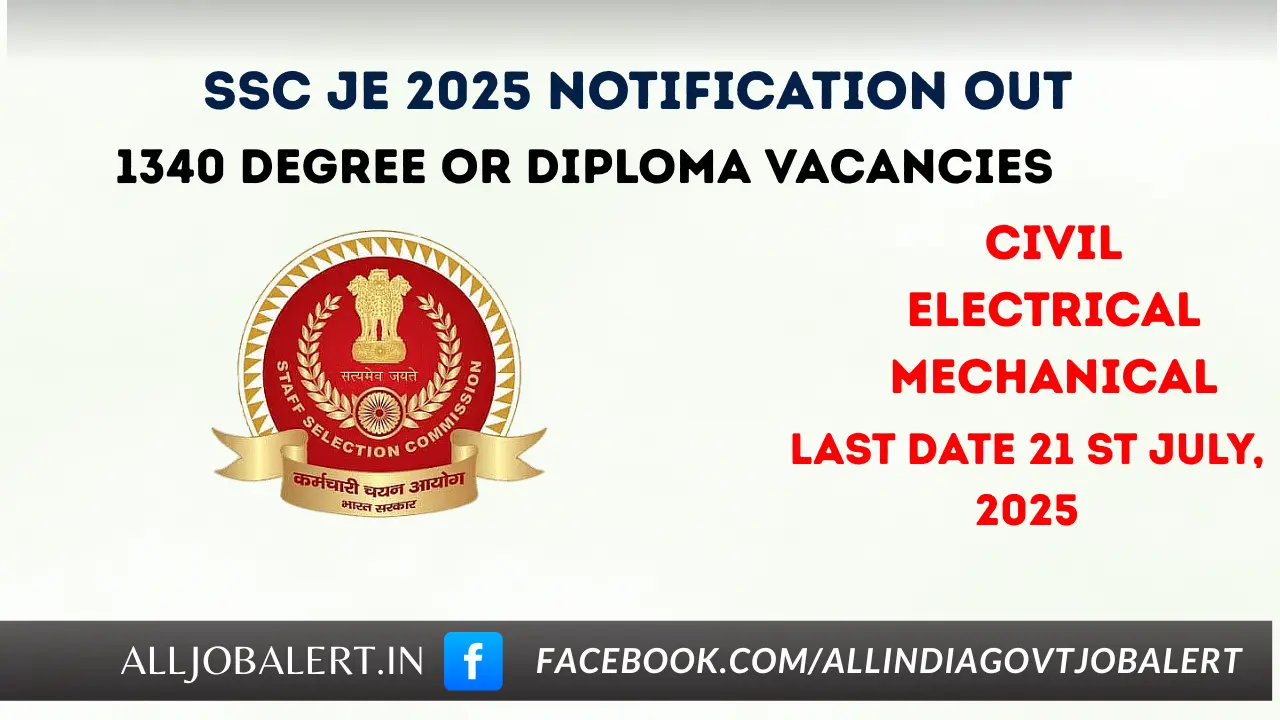
SSC JE 2025 : The Staff Selection Commission (SSC) has released the official notification for the Junior Engineer (JE) Examination 2025 for Civil, Mechanical, and Electrical branches. The exam aims to recruit Group ‘B’ (Non-Gazetted) engineers in various central government departments. Candidates can apply online from 30th June to 21st July 2025. Check important dates, application details, syllabus, salary, and exam schedule here.
SSC JE 2025 Educational Qualification & Age Limit
The following table summarizes the required qualifications and maximum age limit for the Junior Engineer (JE) posts across various departments under SSC JE 2025. Eligibility is calculated as of 01.01.2026.
| S.No | Organization | Post | Qualification Required | Age Limit |
|---|---|---|---|---|
| 1 | Border Roads Organization (BRO) | JE (Civil) | Degree or 3-Yr Diploma in Civil + 2-Yr Experience | Up to 30 yrs |
| JE (E&M) | Degree or 3-Yr Diploma in Electrical/Mechanical/Automobile + 2-Yr Experience | Up to 30 yrs | ||
| 2 | Brahmaputra Board (Min. of Jal Shakti) | JE (Civil) | 3-Yr Diploma in Civil Engineering | Up to 30 yrs |
| 3 | Central Water Commission | JE (Mech) | Degree or Diploma in Mechanical Engineering | Up to 30 yrs |
| JE (Civil) | Degree or Diploma in Civil Engineering | Up to 30 yrs | ||
| 4 | CPWD (Central Public Works Dept.) | JE (Elec) | Diploma in Electrical or Mechanical Engineering | Up to 32 yrs |
| JE (Civil) | Diploma in Civil Engineering | Up to 32 yrs | ||
| 5 | Central Water & Power Research Stn. | JE (Elec) | Diploma in Electrical Engineering | Up to 30 yrs |
| JE (Civil) | Diploma in Civil Engineering | Up to 30 yrs | ||
| 6 | DGQA-Naval (Min. of Defence) | JE (Mech) | Degree or Diploma in Mechanical + 2-Yr Experience | Up to 30 yrs |
| JE (Elec) | Degree or Diploma in Electrical + 2-Yr Experience | Up to 30 yrs | ||
| 7 | Farakka Barrage Project | JE (Elec) | Diploma in Electrical Engineering | Up to 30 yrs |
| JE (Civil) | Diploma in Civil Engineering | Up to 30 yrs | ||
| 8 | Military Engineer Services (MES) | JE (Civil) | Degree or Diploma in Civil + 2-Yr Experience | Up to 30 yrs |
| JE (E&M) | Degree or Diploma in Elec./Mech. + 2-Yr Experience | Up to 30 yrs | ||
| 9 | NTRO (National Tech. Research Org.) | JE (Civil) | Diploma in Civil Engineering | Up to 30 yrs |
JE(C)=Junior Engineer (Civil), JE(M)= Junior Engineer (Mechanical), JE(E) = Junior Engineer (Electrical) & JE(E&M) = Junior Engineer (Electrical & Mechanical).
SSC JE 2025 Vacancy Details
Tentative vacancies: 1340 (One thousand three hundred and forty). Tentative vacancies/Final vacancies post-wise & category-wise, will be made available on the website of the Commission (https://ssc.gov.in>
For Candidates > Tentative Vacancy). Candidates may note that Statewise/ Zone-wise vacancies are not collected by the Commission. Candidates are advised to approach the concerned User Departments for information pertaining to zone-wise/state-wise vacancies, if any.
| Category | Vacancy Count |
|---|---|
| Total Tentative Vacancies | 1340 |
SSC JE 2025 Age Limit & Relaxation
The crucial date for age calculation is 01 January 2026. Candidates must ensure that their date of birth matches their matriculation certificate. Any mismatch or incorrect DOB will lead to disqualification.
Age limits vary based on the department (30 or 32 years), and category-wise relaxation is applicable as per government rules.
| Post Type | Date of Birth Range | Max Age |
|---|---|---|
| Posts with age limit up to 30 years | Born between 02.01.1996 and 01.01.2008 | 30 yrs |
| Posts with age limit up to 32 years | Born between 02.01.1994 and 01.01.2008 | 32 yrs |
SSC JE 2025 Age Relaxation (Category-wise)
| Code | Category | Relaxation in Upper Age Limit |
|---|---|---|
| 01 | SC / ST | 5 years |
| 02 | OBC | 3 years |
| 03 | PwBD (UR/EWS) | 10 years |
| 04 | PwBD (OBC) | 13 years |
| 05 | PwBD (SC/ST) | 15 years |
| 06 | Ex-Servicemen (ESM) | 3 years after military service deduction |
| 08 | Disabled Defence Personnel (UR/OBC/EWS) | 3 years |
| 09 | Disabled Defence Personnel (SC/ST) | 8 years |
How to Apply for SSC JE 2025
All candidates must complete One-Time Registration (OTR) on the new SSC website: https://ssc.gov.in.
After OTR, candidates can apply via:
- 📱 mySSC Mobile App (Android – Google Play Store)
- 🌐 Website: https://ssc.gov.in
✅ Aadhaar-Based Authentication is recommended. It allows:
- Real-time photograph capture while applying
- No need for pre-uploaded ID or printed photo at the exam center
- Exemption from strict photo/signature upload rules
🧍 Live Photo Capture Instructions:
- Good lighting and plain background
- No cap, glasses, or mask
- Face fully visible and centered
Note: Must read official PDF BEFOR APPLY ONLINE.
SSC JE 2025 Application Fee
| Applicant Category | Fee Payable |
|---|---|
| General / OBC / EWS | ₹100/- |
| Women / SC / ST / PwBD / Ex-Servicemen | Exempted |
Payment Modes:
- BHIM UPI
- Net Banking
- Debit Cards (Visa/MasterCard/Maestro/RuPay)
🕒 Fee Deadline: 22 July 2025 (11:00 PM)
📌 Note: Incomplete applications due to failed payments will be rejected.
✏️ Application Correction Window
| Details | Info |
|---|---|
| Correction Window Dates | 1st – 2nd August 2025 (11 PM) |
| 1st Correction Charge | ₹200/- |
| 2nd Correction Charge | ₹500/- |
| Allowed Corrections | Max 2 times |
| Payment Mode for Correction | Online only (same as above) |
| Note | No corrections allowed after 2nd submission |
SSC JE 2025 Scheme of Examination
The SSC JE 2025 exam will be conducted in two stages – Paper-I and Paper-II, both in Computer-Based Test (CBT) mode. Candidates must choose the appropriate stream—Civil, Electrical, or Mechanical—while filling the form and attempt only that section in both papers.
All questions will be objective-type MCQs in Hindi & English, and there will be negative marking.
| Paper | Mode | Sections | No. of Qs / Marks | Duration |
|---|---|---|---|---|
| Paper-I | CBT (Online) | 1. General Intelligence & Reasoning 2. General Awareness 3. Part A (Civil) / Part B (Electrical) / Part C (Mechanical) | 50 / 50 50 / 50 100 / 100 | 2 hours (2 hr 40 min for scribe eligible) |
| Paper-II | CBT (Online) | Part A (Civil) / Part B (Electrical) / Part C (Mechanical) | 100 / 300 | 2 hours (2 hr 40 min for scribe eligible) |
Key Points to Remember
- ❌ Negative marking:
- Paper-I: –0.25 marks for each wrong answer
- Paper-II: –1 mark for each wrong answer
- 📚 IS 456:2000 Table & Steam Table will be available digitally on-screen
- 🔢 Scientific calculator will be provided on-screen only
- 📤 Candidates can challenge the answer key by paying ₹100/question
- 📊 Normalization will be applied for exams held in multiple shifts
- 📜 Final merit will be based on normalized marks
SSC JE 2025 – Mode of Selection
The selection process for SSC JE 2025 is based on merit in Paper-I and Paper-II (both Computer-Based Tests). Candidates must meet minimum qualifying marks, fulfill eligibility, and indicate their post / department preferences carefully.
✅ Minimum Qualifying Marks
| Category | Paper-I & Paper-II Minimum Marks |
|---|---|
| UR (General) | 30% |
| OBC / EWS | 25% |
| SC / ST / PwBD | 20% |
🔍 Selection Process Highlights
- Shortlisting for Paper-II is based on normalized marks of Paper-I.
- Paper-II marks are also normalized (Electrical and Mechanical treated as different shifts).
- Final merit list is based on total normalized marks in Paper-I + Paper-II and preferences filled.
- Post Allotment is final. No change will be allowed if the candidate fails to meet any post-specific physical/medical/educational standards.
- Reserved Category candidates qualifying on their own merit will be considered under unreserved quota, wherever advantageous.
- Relaxation in eligibility (e.g., age, qualifications) will be counted only against reserved vacancies.
📌 Additional Selection Guidelines
- Selection is provisional unless eligibility is verified.
- Final appointees will undergo a 2-year probation, including training or departmental exams.
- All selected candidates are subject to All India Service Liability (AISL) and may be required to learn the local language of the posted state/zone.
- If no communication is received within 1 year of result declaration, candidates must contact the concerned department.
- SSC will conduct strict post-exam scrutiny using log records, biometric data, and CCTV footage. Malpractices may result in disqualification and debarment.
📊 SSC JE 2025 – At a Glance
| 🔹 Item | 🔸 Details |
|---|---|
| 📌 Application Link | Apply Online |
| 🌐 Official Website | https://ssc.gov.in |
| 🗓️ Application Start Date | 30 June 2025 |
| 🛑 Application Last Date | 21 July 2025 (11:00 PM) |
| 💰 Application Fee | ₹100/- (Exempted for SC/ST /PwBD/ Women/ESM) |
| 🎂 Age Limit | Up to 30 or 32 years (Post-wise) as on 01.01.2026 |
| 📄 Official Notification PDF | Download PDF |
| 📊 Total Vacancies | 1340 (Tentative) |
| 📘 Syllabus PDF Link | Download Syllabus |
| 🖥️ Exam Dates (Paper I) | 27–31 October 2025 (Tentative) |
❓ SSC JE 2025 – Frequently Asked Questions (FAQs)
1. 🔍 What is the last date to apply for SSC JE 2025?
The last date to submit the online application is 21st July 2025 (11:00 PM).
2. 🧾 What is the application fee for SSC JE 2025?
The fee is ₹100 for General/OBC/EWS candidates.
Women, SC, ST, PwBD, and Ex-Servicemen are exempted from the fee.
3. 🎓 What is the age limit for SSC JE 2025?
The upper age limit is 30 or 32 years, depending on the department. Age is calculated as on 01.01.2026. Relaxations apply for reserved categories.
4. 🖥️ How will the SSC JE 2025 exam be conducted?
The exam will be held in two phases (Paper-I and Paper-II), both in online CBT mode. There will be negative marking in both papers.
5. 📘 Where can I find the SSC JE 2025 syllabus and official notification?
You can download both the syllabus and the official notification PDF from the SSC’s new website:
🔗 https://ssc.gov.in
